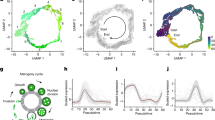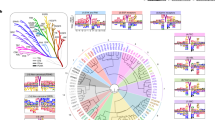Abstract
MODIFICATION of ribosomal proteins has been suggested as a mechanism controlling protein biosynthesis1. In vivo and in vitro phosphorylation of eukaryotic ribosomal proteins has been described and its possible functional relevance discussed2–5. Two-dimensional polyacrylamide gel electrophoresis has shown that only one, small ribosomal subunit protein, S6, is phosphorylated in rat liver6. The number of phosphoserine residues in this protein increases by an order of magnitude during liver regeneration6 and also after administration of inhibitors of protein synthesis7. In addition, when Escherichia coli is infected with bacteriophage T7, various host cell proteins, including some ribosomal proteins, are phosphorylated8. In our search for possible regulatory changes in the protein synthesising apparatus of virus-infected cells, we have now examined the phosphorylation of ribosomal proteins in HeLa cells infected with vaccinia virus.
This is a preview of subscription content, access via your institution
Access options
Subscribe to this journal
Receive 51 print issues and online access
$199.00 per year
only $3.90 per issue
Buy this article
- Purchase on Springer Link
- Instant access to full article PDF
Prices may be subject to local taxes which are calculated during checkout
Similar content being viewed by others
References
Kurland, C. G., A. Rev. Biochem., 41, 377–408 (1972).
Kabat, D., Biochemistry, 9, 4160–4175 (1970).
Loeb, J. E., and Blat, C., FEBS Lett., 10, 105–108 (1970).
Eil, C., and Wool, I. G., Biochem. biophys. Res. Commun., 43, 1001–1009 (1971).
Traugh, J. A., Mumby, M., and Traut, R. R., Proc. natn. Acad. Sci. U.S.A., 70, 373–376 (1973).
Gressner, A. M., and Wool, I. G., J. biol. Chem., 249, 6917–6925 (1974).
Gressner, A. M., and Wool, I. G., Biochem. biophys. Res. Commun., 60, 1482–1490 (1974).
Rahmsdorf, H. J., Herrlich, P., Pai, S. H., Schweiger, M., and Wittmann, H. G., Molec. gen. Genet., 127, 259–271 (1973).
Jungwirth, C., Launer, J., Dombrowski, G., and Horak, I., J. Virol., 4, 866–871 (1969).
Schreier, M. H., and Staehelin, T., J. molec. Biol., 73, 329–349 (1973).
Sherton, C. C., and Wool, I. G., J. biol. Chem., 247, 4460–4467 (1972).
Kaltschmidt, E., and Wittmann, H. G., Analyt. Biochem., 36, 401–412 (1970).
Eil, E., and Wool, I. G., J. biol. Chem., 248, 5122–5129 (1973).
Paoletti, E., and Moss, B., J. Virol., 10, 417–424 (1972).
Kleinmann, J. H., and Moss, B., J. biol. Chem., 250, 2430–2437 (1975).
Author information
Authors and Affiliations
Rights and permissions
About this article
Cite this article
KAERLEIN, M., HORAK, I. Phosphorylation of ribosomal proteins in HeLa cells infected with vaccinia virus. Nature 259, 150–151 (1976). https://doi.org/10.1038/259150a0
Received:
Accepted:
Issue Date:
DOI: https://doi.org/10.1038/259150a0
This article is cited by
-
Ribosome and protein synthesis modifications after infection of human epidermoid carcinoma cells with herpes simplex virus type 1
Molecular and General Genetics MGG (1990)
-
Phosphorylation of myelin basic protein by vaccinia virus
Medical Microbiology and Immunology (1980)
-
Ribosomal proteins of the dimorphic fungus, Mucor racemosus
Molecular and General Genetics MGG (1979)
Comments
By submitting a comment you agree to abide by our Terms and Community Guidelines. If you find something abusive or that does not comply with our terms or guidelines please flag it as inappropriate.



